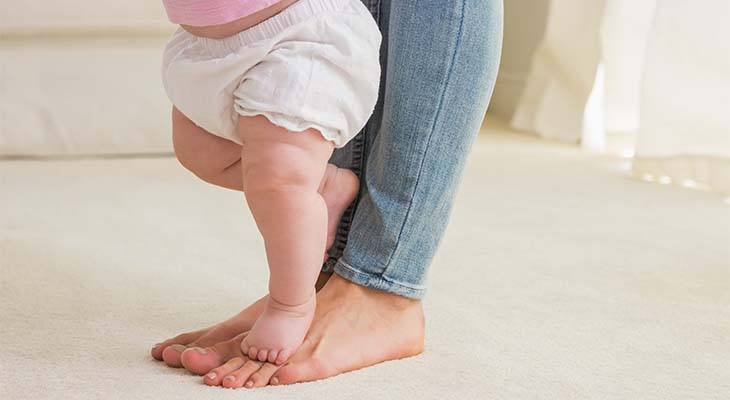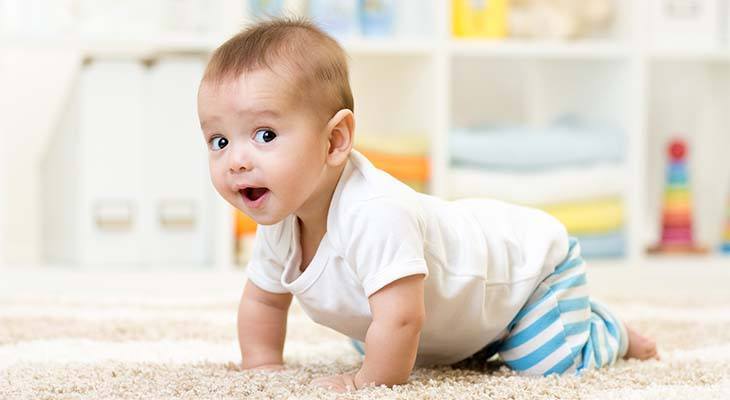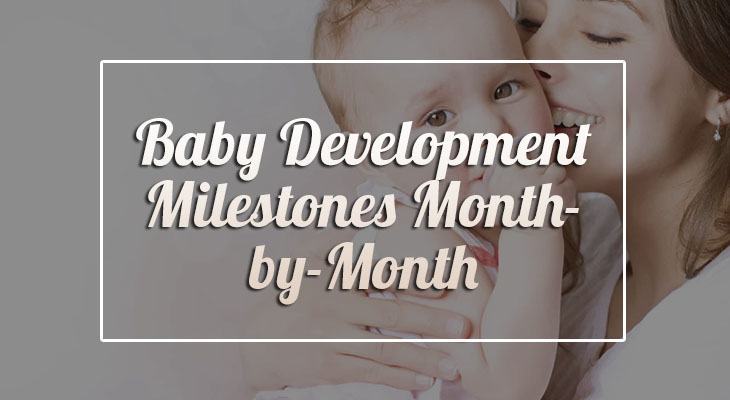Baby Milestones: What to Expect on Your Baby Development Stages for The First 12 Months
Parenting can be tough, especially for first-time mommies and daddies. You’re not familiar with baby development milestones yet since you haven’t witnessed them for yourselves.
Of course, you want only the best to ensure that your baby’s progress is right on time.
Knowing what babies can do as they grow up during their first few months will help you care for them better. It can also be beneficial in medical terms.
You can update your doctor about your baby’s developmental milestones and expect professional advice from them moving forward. After all, baby health is very important.
Just to comfort you a little bit, a newborn doesn’t do much during his first few weeks. Most of the time they cry to communicate with you, and that’s mostly what they do aside from eating and sleeping.
So, reserve the question “when do babies talk?” for a later date.
If you want to learn more about premature development for babies, read these articles – Premature Baby Development, Baby Development and Fetal Development Week by Week.
Learn more about baby development month by month guide!
Baby milestones are not just achievements for babies. It’s also heartwarming and rewarding for you as parents. Seeing your toddler develop abilities like improved motor skills and reflexes on his own is always a great experience to have.
That makes taking care of a baby a huge family endeavor as well as bonding. Good thing you don’t need to experience everything to learn more about something! There are a variety of instructional guides you can use to give you prior knowledge about parenting.
Peruse books, check out parenting forums and blogs, buy educational toys, and download lifestyle apps to help you with this new and wonderful journey.
Check out these articles about The Best Baby Development App and Baby Development Toys to discover which ones would fit you and your baby’s needs the best.
But enough of that! By reading this article, you can also get a rough idea of what the first 12 months of your baby will bring to your household.
After reading this article, you will know:
- What your baby will learn month by month
- How to get yourself ready for the first 12 months of taking care of your baby
- When your baby should know what stuff
- If your baby might need special assistance
- And many more
So, in this article, we’ll explore:
- What are developmental milestones?
- Baby milestones month to month
- When do most babies walk?
- When do babies sit up?
- When do babies crawl?
- How far can my baby see?
- When do babies roll over?
How to Read this Article
If you are a new parent:
- Learn more about what you might experience for the first 12 months
- Find out each milestone and set reasonable expectations
If you are an experienced parent:
- Review if you’re current knowledge is up to par to an average baby’s standard milestones
- Get a chance to widen your baby knowledge even further
If you are a friend of someone who has a baby:
- Find out more about the challenges your friend’s baby are about to face
- Share information that can help your friend in her parenting journey
If you just want to gather information about baby development and milestones:
- Read on to learn more about how each month is essential for developing a baby’s basic skills and many, many more.
What Are Developmental Milestones?

Developmental milestones (and child milestones) are what average babies develop or learn to do by a specific time. Most newborn babies have a documented 12-month milestone guide to help parents know if their child is lagging behind.
However, this is also an excellent time to remind you that not all babies are alike. You might experience taking care of a child that develops and learns new skills at a faster rate, or you might have one who needs a longer time to learn new things.
That’s okay! Unless your pediatrician seems alarmed during your monthly check-ups, being a bit advanced or a bit late is no reason for you to worry. Each baby just responds differently to new experiences.
If you want to learn more about your baby’s neurological development, check out this article – Baby Brain Development.
Baby Milestones Month to Month
Now that you know that your infant might reach each development differently, it doesn’t change the fact that you probably still want to learn more about what to expect per month.
Just remember that this baby milestones by month guide are only recommendations of what a child should be able to do.
Here are 12 months’ worth of milestones for you to check out:
1 Month Milestones
Nothing too drastic happens during the 1 month baby development. The most prominent one month milestones are visual and auditory.
By the first month, your baby’s hearing is fully developed. He might even start making some sounds all on his own (aside from his constant crying). His eyesight will also improve. Although babies usually see only 8 to 12 feet of what’s in front of them, your baby may start to notice faces.
Does that mean he’ll recognize you already? Probably not. But he will know the difference between a face and the wall, the sofa, the crib, and etcetera. Your baby will also be drawn to bold patterns especially if they’re in black and white.
If you want to learn more about your baby’s eyesight, read this article – Baby Eye Development.
2 Month Milestones
Baby development 2 months in will welcome the start of facial expressions and the ability to feel more emotions. Two month milestones include smiling and getting bored.
For his eyesight, your little one will start following things with his eyes. Movements will draw his attention better. This is an important milestone to track since it can be indicative of visual impairment. He can also recognize your face by this time. He can also hold his head up for a few seconds while lying on his stomach.
Emotions start to develop as well. Your baby will be learning how to smile at 2 months old genuinely. He will also feel bored with an activity. A good indication will be if he starts getting fussy.
3 Month Milestones
3 month baby milestones are a continuation of improving your baby’s emotional range. He would start actively playing with people, and will as equally actively tell you when he doesn’t find something entertaining anymore.
He will start to distinguish between different faces by this time. Opening and closing his hands at will is another achievement he’ll master.
He will also start turning his head towards the direction where he hears a sound. Again, look into this milestone closely as it might be indicative of a hearing impairment if not met.
4 Month Milestones
Baby development in 4 months is an excellent milestone in itself! At four months, your little one is no longer considered a newborn. He will be a lot more active and eager to explore the environment around him.
If he just started smiling two months before, now he will be noisily (and adorable) laughing so bring on the funny faces and hilarious sounds. You might also notice that he’ll try to imitate your facial expressions by this time.
He would also be able to support his own head without any help, and might even be able to push himself up on his elbows.
By this month, your baby will appreciate his toys more, and you’ll see him reaching out for them on his own.
5 Month Milestones
When your baby turns 5 months, you’ll notice that he makes sounds a lot more and seems like he’s talking to you. Babbling is an excellent indicator that your baby is developing an idea about communication and language.
Another great achievement you’ll witness is your baby being able to roll from his tummy towards his back. Rolling might seem like a small thing, but it’s a good sign that his body is getting a lot stronger.
Another amusing thing you’ll experience is your baby’s new found love for mirrors. Now that he can distinguish faces, he’ll find his actions and features interesting.
It’s also a good idea to keep a watch on him when he’s playing with his toys. He’ll likely try to put everything in his mouth.
If you want to learn more about your baby’s understanding of language, read this article – Baby Language Development.
6 Month Milestones
The 6 month old baby development marks the beginning of your baby’s journey to harder developmental milestones. Things like sitting down, standing up, and walking can be learned during the latter half of the year, after all.
In fact, your baby’s back will be strong enough to support him in an unaided sitting position. But that’s not the only six month milestones you might witness.
You will notice that your precious toddler can now understand a few simple words. The key to this is repetition. Always practice with him to help him remember the meaning of the words. He’ll be able to associate ‘mama’ with his mother as well as ‘dada’ with his father.
And the greatest achievement? He’ll be able to understand and respond to his own name!
7 Month Milestones
Ahh, 7 months! It’s the start of your little one’s more annoying habits. But be more patient since interacting with the many objects around him is a good sign that he’s curious and willing to learn more.
Baby development at 7 months is all about improving interaction. He’s starting to act a little bit more independently, and your baby will want to experience anything and everything literally! One game he probably enjoys by now is dropping things on the floor.
He’ll also love simple games like peekaboo and close-open. Another annoying habit is his understanding of the word ‘no’ so get ready for little tantrums when he doesn’t get his way.
Overall, this playful side is constructive when it comes to honing his skills in communication and mobility.
8 Month Milestones
By this time, you’ll notice that the baby milestones month by month is getting harder and more movement-based. This is all well and normal but remember that there are more things to teach your kid than moving. Don’t forget to continue honing his curiosity, social skills, and speech.
By this age, he will start crawling on his own. This is a significant achievement as it’s the beginning of learning to walk.
Another notable milestone is your baby’s ability to stand while holding something. Yes, it’s at this moment that your back would probably hurt from stooping so much.
9 Month Milestones
Your friends and relatives would probably not appreciate this new learning. Your baby will be more wary of strangers than before. He’ll likely not welcome anyone he hasn’t seen for quite some time, and he might cling to you more as well (especially when you’re out in public).
Another 9 month old development is your baby learning to point out what he wants. This is the next big thing from talking when it comes to communicating with you so congratulations!
You’ll also notice that your baby might ask for some toys more than others. He has also learned the idea of having favorites.
Lastly, an amusing milestone you will experience during this month is his insistence on trying different sounds. He’ll want to learn different tones and is an excellent sign that he’s going forward his way to talking.
10 Month Milestones
Wow, 10 months! Oh, baby! Your little one is officially a small person. He can now pull himself up to a standing position. He can even start walking if you help him move from one place to another!
Another position he can do unaided is sitting. Pulling himself up to a sitting position is easy now that he can also stand. Talk about 10 month old baby milestones, right?
This next development is a great survival skill on its own, but it can get annoyingly messy for you. Your baby can now feed himself. Make sure to cut his food in small pieces and only give him ones that don’t have soup or sauces. You’ll be dealing with sticky fingers if you do!
11 Month Milestones
Baby-proof the house and put a gate on all staircases! Your little one can now crawl upstairs (a dangerous achievement if you don’t keep him in sight).
Another milestone to be wary of his separation anxiety. Babies can now understand the idea of leaving. He might get fussy and downright miserable if he can’t see you after a while.
If you have to go somewhere (for example, working moms who have to go back to work), slowly ease him to this rather than just disappearing suddenly.
On a lighter note, he can now successfully do different tones and varieties of sounds. He really does sound like he’s talking now.
12 Month Milestones
Congratulations, you both reached the 1st year milestone! Your baby is growing strong every day and is learning more advanced stuff as time passes by. He can now say mama and dada at last! You’d definitely be proud of that.
You can also ask him simple questions and give easy directions since he knows how to respond to that as well. He can also make basic gestures like waving goodbye and shaking his head.
Another exciting achievement is that he can now stand alone and even take a few steps without having to ask for your help!
These might be some of the baby development milestones you’ll encounter, but they are definitely not the only ones. Nor is your baby finished with learning everything there is to learn. These milestones are just the beginning.
If you want to learn more about how to help your baby learn more words, read this article – Baby Speech Development.
When Do Most Babies Walk?

There’s no definite time when babies start walking. All babies are different. Some may begin showing signs as early as 6 months while others will only begin at a later date. That’s completely okay! But if you want a rough time frame, here’s the answer:
Babies begin walking anytime between 8 and 16 months. Some babies begin walking even later than that. – Mama Natural
Don’t be alarmed if your baby hasn’t taken any unassisted steps after his first birthday. Maybe he’s just a late bloomer.
Anyway, you’ll be running around the house and trying to catch him before he falls by the time he does learn how to walk. Take this time to relax.
When Do Babies Sit Up?
Don’t get frustrated if you keep reading the phrase “it depends” because there really isn’t a set timeframe for these kinds of things. But a rough estimate of when a baby could sit up usually starts at the four-month mark.
During this time, their body is developed enough to try out a new position. Help them get into a sitting pose for the time being. These allow them to look at and explore the world from another exciting point of view.
After a few months (usually by 6 months), they’ll be able to sit alone.
When Do Babies Crawl?

Most babies start crawling by six months. This is the initial step before walking after all. It’s easier to achieve since being on all fours is nearer to the sitting position rather than standing.
But some babies skip this step altogether. Pediatricians say that parents shouldn’t be alarmed if this happens. Some babies just like to transition from sitting to standing to walking, and that’s okay.
However, babies that went through the crawling phrase is better at developing their motor skill at that moment, though.
How Far Can My Baby See?
Many people might not know this little fact, but a human’s eyesight isn’t at all clear after birth. Since they’re just learning about the new visual stimulus around them, most babies can’t distinguish differences.
Plus, they can only see up to about 10 inches away from their face.
At birth, your baby’s eyes have the visual acuity of 20/400, but his rapidly developing vision will reach the adult level of 20/20 by the time he is 3-5 years old. – Parent’s Magazine
By three months old, most babies will be able to control their eye movement better. You will notice that your child is following moving objects more than before. If this doesn’t happen by four to five months, you might want to have him checked by your pediatrician.
If you want to learn more about infant eyesight, read this article – Baby Vision Development.
When Do Babies Roll Over?
Different babies develop their muscles at different times. Rolling over is a skill that takes time for some and not a lot of time for others.
Don’t be dismayed if your baby doesn’t roll over early. It might be because of his weight, or his muscles might not just be ready, or he hasn’t had firm control of the required motor skill yet.
The earliest some babies roll over on their own is 3 months, but some can take up to 7 months. As long as your pediatrician is not worried, you shouldn’t worry as well.
If you want further information about baby milestones, why not check out this video: Baby Month by Month Development & Growth After Birth?


